Editor’s note: This press release was originally published by SLAC National Accelerator Laboratory.
The U.S. Department of Energy’s Fermi National Accelerator Laboratory designed, built and tested 18 of the 37 cryogenic accelerator modules that are installed in the LCLS-II linac. In total for LCLS-II, 41 modules were delivered to SLAC of which Fermilab supplied 20 modules, including spares, and Jefferson Lab, a key partner in this project, supplied the remainder. The performance of these modules on the test stand dramatically exceeded the then state of the art and set the stage for an additional upgrade (LCLS-II HE) and for future CW FELs.
Nestled 30 feet underground in Menlo Park, California, a half-mile-long stretch of tunnel is now colder than most of the universe. It houses a new superconducting particle accelerator, part of an upgrade project to the Linac Coherent Light Source (LCLS) X-ray free-electron laser at the Department of Energy’s SLAC National Accelerator Laboratory.
Crews have successfully cooled the accelerator to minus 456 degrees Fahrenheit – or 2 kelvins – a temperature at which it becomes superconducting and can boost electrons to high energies with nearly zero energy lost in the process. It is one of the last milestones before LCLS-II will produce X-ray pulses that are 10,000 times brighter, on average, than those of LCLS and that arrive up to a million times per second – a world record for today’s most powerful X-ray light sources.
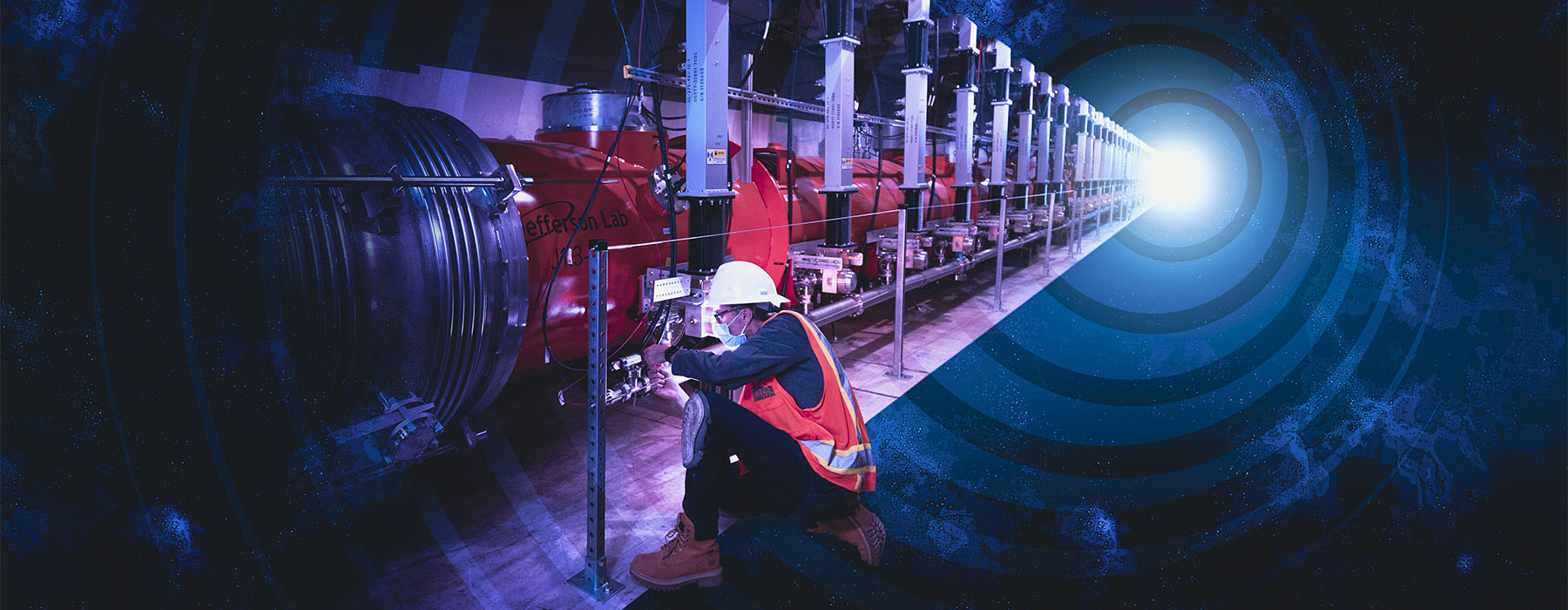
A half-mile-long stretch of tunnel in Menlo Park, California is now colder than most of the universe. It houses a new superconducting particle accelerator, part of an upgrade project to the Linac Coherent Light Source (LCLS) X-ray free-electron laser. Photo: Jim Gensheimer/Greg Stewart, SLAC
“In just a few hours, LCLS-II will produce more X-ray pulses than the current laser has generated in its entire lifetime,” said Mike Dunne, director of LCLS. “Data that once might have taken months to collect could be produced in minutes. It will take X-ray science to the next level, paving the way for a whole new range of studies and advancing our ability to develop revolutionary technologies to address some of the most profound challenges facing our society.”
With these new capabilities, scientists can examine the details of complex materials with unprecedented resolution to drive new forms of computing and communications; reveal rare and fleeting chemical events to teach us how to create more sustainable industries and clean energy technologies; study how biological molecules carry out life’s functions to develop new types of pharmaceuticals; and peek into the bizarre world of quantum mechanics by directly measuring the motions of individual atoms.
A chilling feat
LCLS, the world’s first hard X-ray free-electron laser (XFEL), produced its first light in April 2009, generating X-ray pulses a billion times brighter than anything that had come before. It accelerates electrons through a copper pipe at room temperature, which limits its rate to 120 X-ray pulses per second.
In 2013, SLAC launched the LCLS-II upgrade project to boost that rate to a million pulses and make the X-ray laser thousands of times more powerful. For that to happen, crews removed part of the old copper accelerator and installed a series of 37 cryogenic accelerator modules, which house pearl-like strings of niobium metal cavities. These are surrounded by three nested layers of cooling equipment, and each successive layer lowers the temperature until it reaches nearly absolute zero – a condition at which the niobium cavities become superconducting.
“Unlike the copper accelerator powering LCLS, which operates at ambient temperature, the LCLS-II superconducting accelerator operates at 2 kelvins, only about 4 degrees Fahrenheit above absolute zero, the lowest possible temperature,” said Eric Fauve, the Cryogenic Division director at SLAC. “To reach this temperature, the linac is equipped with two world-class helium cryoplants, making SLAC one of the significant cryogenic landmarks in the U.S. and on the globe. The SLAC Cryogenics team has worked on site throughout the pandemic to install and commission the cryogenic system and cool down the accelerator in record time.”
One of these cryoplants, built specifically for LCLS-II, cools helium gas from room temperature all the way down to its liquid phase at just a few degrees above absolute zero, providing the coolant for the accelerator.
On April 15, the new accelerator reached its final temperature of 2 K for the first time, and today, May 9, is stable in its final configuration.
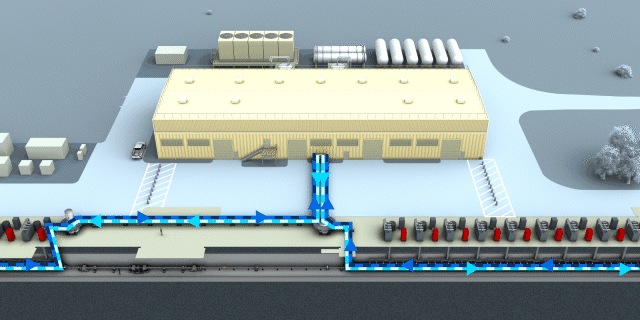
The linac is equipped with two world-class helium cryoplants. One of these cryoplants, built specifically for LCLS-II, cools helium gas from room temperature all the way down to its liquid phase at just a few degrees above absolute zero, providing the coolant for the accelerator. Photo: Greg Stewart, SLAC
“The cooldown was a critical process and had to be done very carefully to avoid damaging the cryomodules,” said Andrew Burrill, director of SLAC’s Accelerator Directorate. “We’re excited that we’ve reached this milestone and can now focus on turning on the X-ray laser.”
Bringing it to life
In addition to a new accelerator and a cryoplant, the project required other cutting-edge components, including a new electron source and two new strings of undulator magnets that can generate both “hard” and “soft” X-rays. Hard X-rays, which are more energetic, allow researchers to image materials and biological systems at the atomic level. Soft X-rays can capture how energy flows between atoms and molecules, tracking chemistry in acton and offering insights into new energy technologies. To bring this project to life, SLAC teamed up with four other national labs – Argonne, Berkeley Lab, Fermilab and Jefferson Lab – and Cornell University.
Jefferson Lab, Fermilab and SLAC pooled their expertise for research and development on cryomodules. After constructing the cryomodules, Fermilab and Jefferson Lab tested each one extensively before the vessels were packed and shipped to SLAC by truck. The Jefferson Lab team also designed and helped procure the elements of the cryoplants.
“The LCLS-II project required years of effort from large teams of technicians, engineers and scientists from five different DOE laboratories across the U.S. and many colleagues from around the world,” said Norbert Holtkamp, SLAC deputy director and the project director for LCLS-II. “We couldn’t have made it to where we are now without these ongoing partnerships and the expertise and commitment of our collaborators.”
Toward first X-rays
Now that the cavities have been cooled, the next step is to pump them with more than a megawatt of microwave power to accelerate the electron beam from the new source. Electrons passing through the cavities will draw energy from the microwaves so that by the time the electrons have passed through all 37 cryomodules, they’ll be moving close to the speed of light. Then they’ll be directed through the undulators, forcing the electron beam on a zigzag path. If everything is aligned just right – to within a fraction of the width of a human hair – the electrons will emit the world’s most powerful bursts of X-rays.
This is the same process that LCLS uses to generate X-rays. However, since LCLS-II uses superconducting cavities instead of warm copper cavities based on 60-year-old technology, it can can deliver up to a million pulses per second, 10,000 times the number of X-ray pulses for the same power bill.
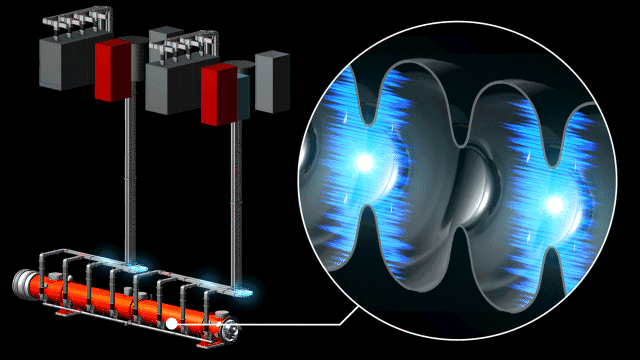
Now that the cavities have been cooled, the next step is to pump them with more than a megawatt of microwave power to accelerate the electron beam from the new source. Electrons passing through the cavities will draw energy from the microwaves so that by the time the electrons have passed through all 37 cryomodules, they’ll be moving close to the speed of light. Photo: Greg Stewart, SLAC
Once LCLS-II produces its first X-rays, which is expected to happen later this year, both X-ray lasers will work in parallel, allowing researchers to conduct experiments over a wider energy range, capture detailed snapshots of ultrafast processes, probe delicate samples and gather more data in less time, increasing the number of experiments that can be performed. It will greatly expand the scientific reach of the facility, allowing scientists from across the nation and around the world to pursue the most compelling research ideas.
This project is supported by DOE’s Office of Science. LCLS is a DOE Office of Science user facility.
When designing a next-generation quantum computer, a surprisingly large problem is bridging the communication gap between the classical and quantum worlds. Such computers need a specialized control and readout electronics to translate back and forth between the human operator and the quantum computer’s languages — but existing systems are cumbersome and expensive.
However, a new system of control and readout electronics, known as Quantum Instrumentation Control Kit, or QICK, developed by engineers at the U.S. Department of Energy’s Fermi National Accelerator Laboratory, has proved to drastically improve quantum computer performance while cutting the cost of control equipment.
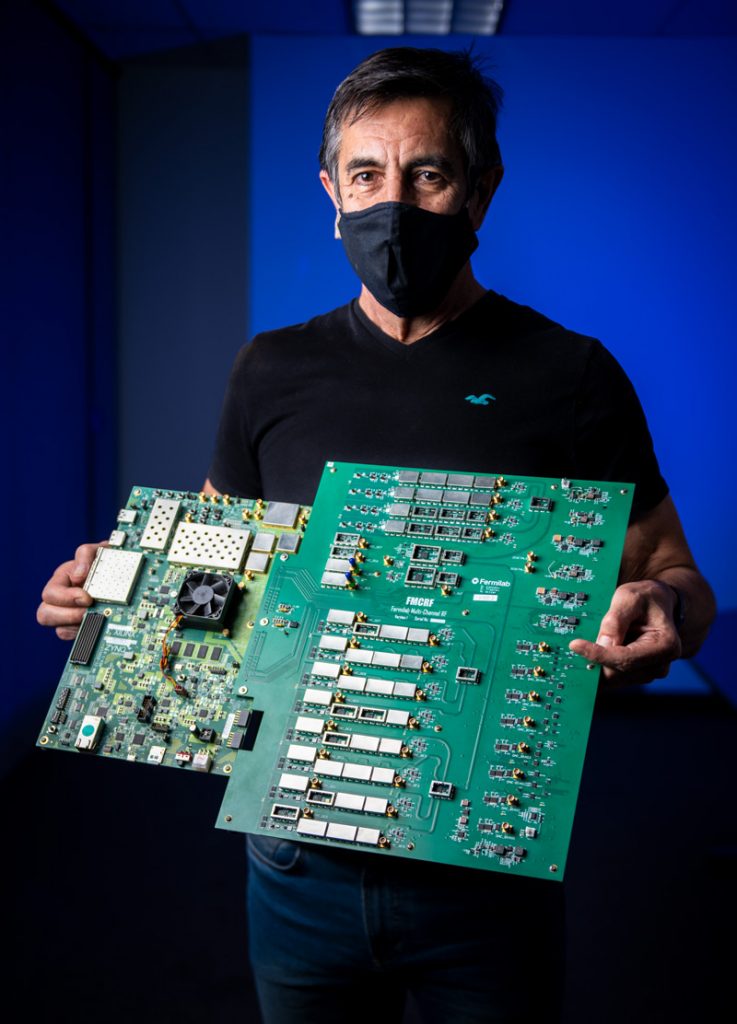
Gustavo Cancelo led a team of Fermilab engineers to create a new compact electronics board: It has the capabilities of an entire rack of equipment that is compatible with many designs of superconducting qubits at a fraction of the cost. Photo: Ryan Postel, Fermilab
“The development of the Quantum Instrumentation Control Kit is an excellent example of U.S. investment in joint quantum technology research with partnerships between industry, academia and government to accelerate pre-competitive quantum research and development technologies,” said Harriet Kung, DOE deputy director for science programs for the Office of Science and acting associate director of science for high-energy physics.
The faster and more cost-efficient controls were developed by a team of Fermilab engineers led by senior principal engineer Gustavo Cancelo in collaboration with the University of Chicago whose goal was to create and test a field-programmable gate array-based (FPGA) controller for quantum computing experiments. David Schuster, a physicist at the University of Chicago, led the university’s lab that helped with the specifications and verification on real hardware.
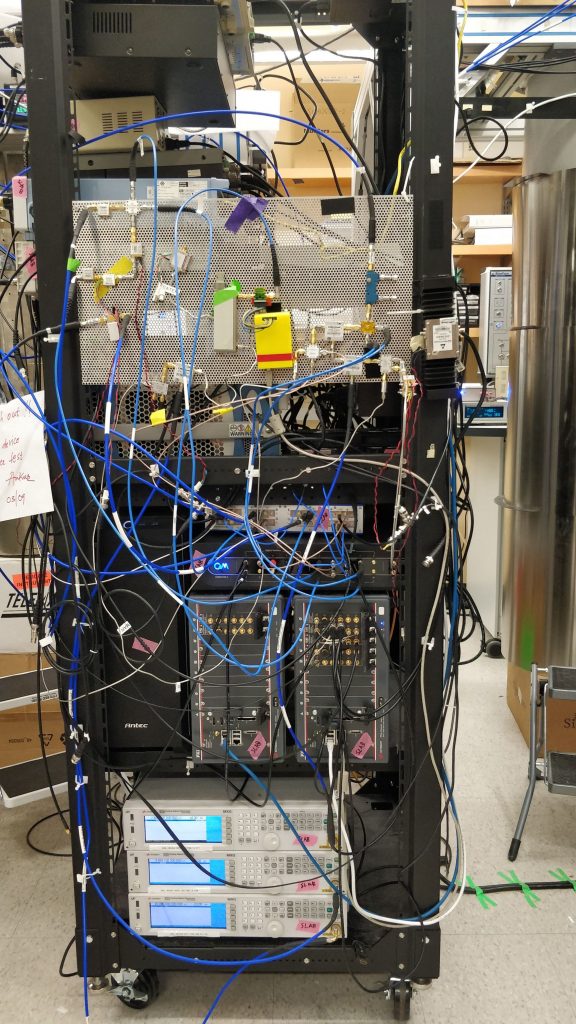
Most of the current control and readout systems for superconducting quantum computers use off-the-shelf commercial equipment in which researchers must string together a dozen or more expensive components resulting bulky and expensive control systems. Photo: The University of Chicago
“This is exactly the type of project that combines the strengths of a national laboratory and a university,” said Schuster. “There is a clear need for an open-source control hardware ecosystem, and it is being rapidly adopted by the quantum community.”
Engineers designing quantum computers deal with the challenge of bridging the two seemingly incompatible worlds of quantum and classical computers. Quantum computers are based on the counterintuitive, probabilistic rules of quantum mechanics that govern the microscopic world, which enables them to perform calculations that ordinary computers cannot. Because people live in the macroscopic visible world where classical physics reigns, control and readout electronics act as the interpreter connecting these two worlds.
Control electronics use signals from the classical world as instructions for the computer’s quantum bits, or qubits, while readout electronics measure the states of the qubits and convey that information back to the classical world.
One promising technology for quantum computers uses superconducting circuits as qubits. Currently, most control and readout systems for superconducting quantum computers use off-the-shelf commercial equipment not specialized to the task. As a result, researchers often must string together a dozen or more expensive components. The cost can quickly add up to tens of thousands of dollars per qubit, and the large size of these systems creates more problems.
Despite recent technological advances, qubits still have a relatively short lifetime, generally a fraction of a millisecond, after which they generate errors. “When you work with qubits, time is critical. Classical electronics take time to respond to the qubits, limiting the performance of the computer,” said Cancelo.
Just as the effectiveness of an interpreter depends on rapid communication, the effectiveness of a control and readout system depends on its turnaround time. And a large system made of many modules means long turnaround times.
To address this issue, Cancelo and his team at Fermilab designed a compact control and readout system. The team incorporated the capabilities of an entire rack of equipment in a single electronics board slightly larger than a laptop. The new system is specialized, yet it is versatile enough to be compatible with many designs of superconducting qubits.
“We are designing a general instrument for a large variety of qubits, hoping to cover those that will be designed six months or a year from now,” Cancelo said. “With our control and readout electronics, you can achieve functionality and performance that is hard or impossible to do with commercial equipment.”
The control and readout of qubits depend on microwave pulses — radio waves at frequencies similar to the signals that carry mobile phone calls and heat up microwave dinners. The Fermilab team’s radio frequency (RF) board contains more than 200 elements: mixers to tweak the frequencies; filters to remove undesired frequencies; amplifiers and attenuators to adjust the amplitude of the signals; and switches to turn signals on and off. The board also contains a low-frequency control to tune certain qubit parameters. Together with a commercial field-programmable gate array, or FPGA, board, which serves as the “brains” of the computer, the RF board provides everything scientists need to communicate successfully with the quantum world.
The two compact boards cost about 10 times less to produce than conventional systems. In their simplest configuration, they can control eight qubits. Integrating all the RF components into one board allows for faster, more precise operation as well as real-time feedback and error correction.
“You need to inject signals that are very, very fast and very, very short,” said Fermilab engineer Leandro Stefanazzi, a member of the team. “If you don’t control both the frequency and duration of these signals very precisely, then your qubit won’t behave the way you want.”
Designing the RF board and layout took about six months and presented substantial challenges: adjacent circuit elements had to match precisely so that signals would travel smoothly without bouncing and interfering with each other. Plus, the engineers had to carefully avoid layouts that would pick up stray radio waves from sources like cell phones and WiFi. Along the way, they ran simulations to verify that they were on the right track.
The design is now ready for fabrication and assembly, with the goal of having working RF boards this summer.
Throughout the process, the Fermilab engineers tested their ideas with the University of Chicago. The new RF board is ideal for researchers like Schuster who seek to make fundamental advances in quantum computing using a wide variety of quantum computer architectures and devices.
“I often joke that this one board is going to potentially replace almost all of the test equipment that I have in my lab,” said Schuster. “Getting to team up with people who can make electronics work at that level is incredibly rewarding for us.”
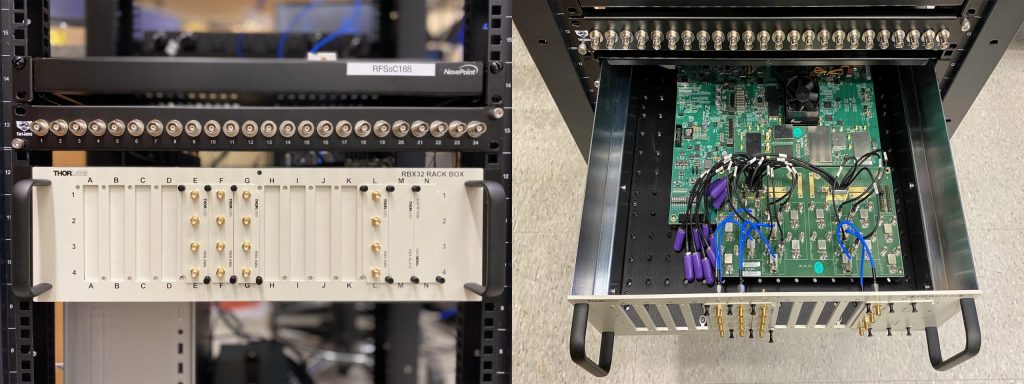
The new compact design of the quantum control system developed by Fermilab and the University of Chicago saves space, is much less expensive and is being quickly adopted by the quantum community. Photo: The University of Chicago
The new system is easily scalable. Frequency multiplexing qubit controls, analogous to sending multiple phone conversations over the same cable, would allow a single RF board to control up to 80 qubits. Thanks to their small size, several dozen boards could be linked together and synchronized to the same clock as part of larger quantum computers. Cancelo and his colleagues described their new system in a paper recently published in the AIP Review of Scientific Instruments.
The Fermilab engineering team has taken advantage of a new commercial FPGA chip, the first to integrate digital-to-analog and analog-to-digital converters directly into the board. It substantially speeds up the process of creating the interface between the FPGA and RF boards, which would have taken months without it. To improve future versions of its control and readout system, the team has started designing its own FPGA hardware.
The development of QICK was supported by QuantISED, the Quantum Science Center (QSC) and later by the Fermilab-hosted Superconducting Quantum Materials and Systems Center (SQMS). The QICK electronics is important for research at the SQMS, where scientists are developing superconducting qubits with long lifetimes. It is also of interest to a second national quantum center where Fermilab plays a key role, the QSC hosted by Oak Ridge National Laboratory.
A low-cost version of the hardware is now available only for universities for educational purposes. “Due to its low cost, it allows smaller institutions to have powerful quantum control without spending hundreds of thousands of dollars,” said Cancelo.
“From a scientific point of view, we are working on one of the hottest topics in physics of the decade as an opportunity,” he added. “From an engineering point of view, what I enjoy is that many areas of electronic engineering need to come together to be able to successfully execute this project.”
Fermi National Accelerator Laboratory is America’s premier national laboratory for particle physics and accelerator research. A U.S. Department of Energy Office of Science laboratory, Fermilab is located near Chicago, Illinois, and operated under contract by the Fermi Research Alliance LLC, a joint partnership between the University of Chicago and the Universities Research Association, Inc. Visit Fermilab’s website and follow us on Twitter at @Fermilab.
